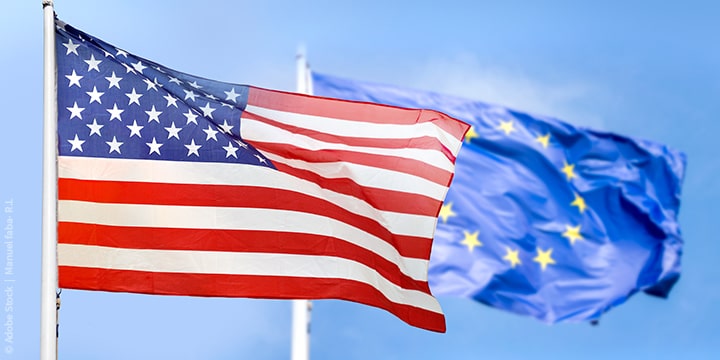

A New Trump Era and Its Consequences
|
Expert Opinion
After the Super Tuesday primaries on March 5 at the latest, it will be a certainty: Donald Trump will be the Republican candidate for the US presidential election. What then? An election victory for the unpredictable politician in November would have far-reaching consequences for Europe and the rest of the world. Not only in terms of foreign and security policy, but also for international trade and climate policy.
During his first term in office, Donald Trump railed against the US’s bilateral trade deficits, particularly with China and Germany. At the time, many experts pointed out that this focus on bilateral trade balances was nonsensical. Now Trump and the Republicans seem to be targeting foreign trade as a whole. They want to increase tariffs until the US foreign trade deficit disappears altogether. Trump has announced that he plans to impose a 10 % tariff on all imports into the US, and as much as a 60 % tariff on imports from China. The aim is to produce more goods and services in the US and create more domestic jobs. Trump had already introduced import tariffs during his first term in office, albeit not across the board. This did not reduce the US’s foreign trade deficit, which amounted to just under 3 % of US gross domestic product for the entire period from 2016 to 2020.
New Trade and Climate Policy?
Would it be any different if tariffs on all imported goods were actually increased during Trump’s second term?
This is unlikely for two reasons. First, the US’s trading partners would take countermeasures, meaning that US exports would also be affected by tariffs. The second reason is more important: Trump will pursue an expansive taxation and fiscal policy as he did in his first term of office; i.e., primarily cutting taxes and increasing government debt. As a result, US interest rates will rise and the US dollar will appreciate. The expansionary fiscal policy thus creates an import pull that is likely to drive up the US trade deficit. Europeans can therefore hope that exports to the US will continue.
Nevertheless, the EU must prepare itself for the protectionism of a Trump administration and conclude as many trade agreements as possible with other countries and regions; for example, finally reaching an agreement with the Mercosur states. Europe also needs a China strategy, as it must expect pressure from the US to further restrict economic relations with China. This would particularly affect Germany, which is more involved in China than other countries are.
It will be difficult to deal with Trump’s climate policy. He plans to stop the climate policy advances made by the Biden administration, withdraw from international climate agreements, and increase the production of oil and gas in the US. Europe can do little more here than wait Trump out and seek dialogue with individual US states in the meantime. Many of them have their own climate policies.
Europe Must Invest in Its Own Strength
There is particular concern that Trump will provide less support for Ukraine and demand that the Europeans themselves contribute more to its defense. To be fair, it’s hard to see why the US should bear a large part of the burden of defending Ukraine and other European states against Russia.
At any rate, Europe’s most important response to a Trump election victory would be to do more for its own economic strength. Over the past two decades, Europe has fallen behind the US economically and technologically due to a lack of economic momentum and innovation. It’s high time to stop this trend. If Europe’s security and prosperity depend primarily on the outcome of US presidential elections, then we have made some fundamental mistakes.
The first step must now be to place our own economic and military strength at the center of political action. This includes defending the rules-based international order with partners wherever possible. Implementing this step should be the central theme of the European election campaign and the policy of the next European Commission. Then the fear of a Trump election victory would have had a positive effect. If he ultimately loses the election, he would have inadvertently done Europe a service.
Clemens Fuest
Professor of Economics and Public Finance
President of the ifo Institute
Published under the title “Stärken wir unsere Stärken!” WirtschaftsWoche, March 1, 2024.